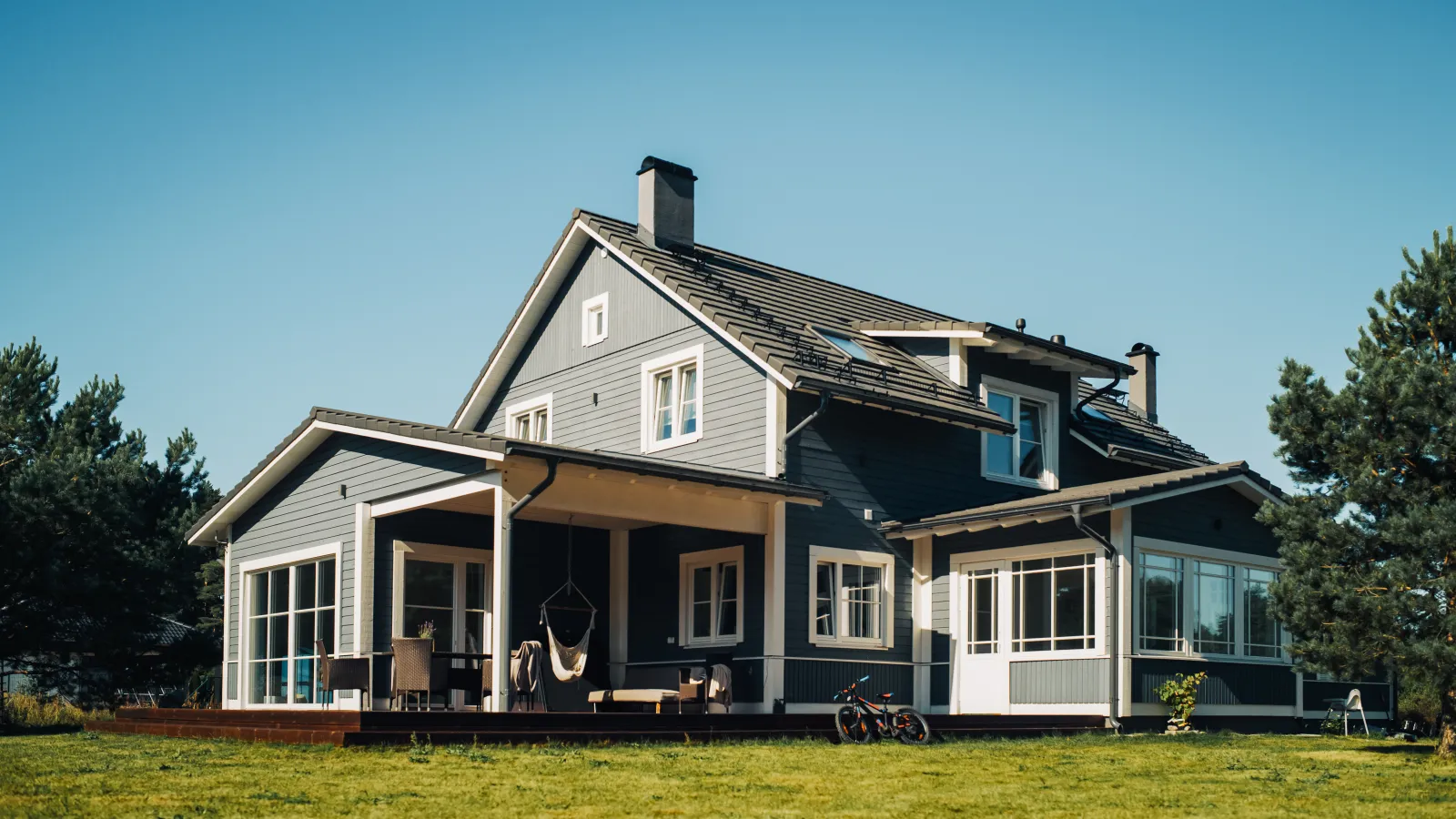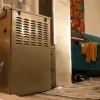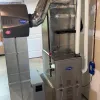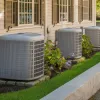Everybody likes to breathe clean air, feel comfortable, and pay as little as possible for heating and cooling. So why is it that so few HVAC companies talk to their customers about air sealing?
We can't say for sure, but here's one thing we do know. Our team always thinks about air leaks and home air sealing when a client says that their HVAC system struggles to make their house comfortable.
That's because your HVAC system might not be the problem. The real issue might be that your house is leaky.
Imagine a refrigerator full of holes.
We'll get to those 7 signs in just a sec. First, let's make sure we're on the same page about air leaks and why they need to be sealed. To better understand the effects of air leaks, it helps to compare your home to a refrigerator. Your kitchen fridge is probably pretty efficient. As long as the door stays closed, it doesn't turn on very often and won't allow much heat to get in.
But what if your fridge was full of holes?
Here's what would happen: Lots of heat would be entering the refrigerator all the time. The fridge would struggle to keep your food cold. And wouldn't be very efficient at all.
Sure, you could put some insulation over the holes, but guess what? Air (and the heat that it carries) can penetrate that insulation. Insulation is helpful when there aren't any holes in the refrigerator. But with the holes? It's almost worthless.
A leaky home has the same problems.
When your house has air leaks, it's like a refrigerator with holes. Hot air gets in during summer. Warm air escapes during winter. It's extremely hard to stay comfortable, even when your HVAC system is working properly.
The solution? It's simple. Seal the leaks.
Typically, canned spray foam and/or silicone caulk are sufficient for sealing the gaps, cracks, and small openings where air leaks into (and out of) your home. But how do you know whether your home needs air sealing? Here are 7 signs:
1. Your HVAC system struggles to satisfy your thermostat setting
When you have a lot of air leaks, your conditioned air is constantly being replaced by unconditioned outdoor air. As a result, your HVAC system may have a hard time keeping you comfortable.
That's not to say that short HVAC run cycles are always desirable. Really short cycles may be a sign of a different, but related, problem. But when the system keeps running and takes forever to meet your thermostat set point, it could indicate a leaky home.
2. Utility bills spike in winter and summer
This, of course, is the unpleasant result of an overworked HVAC system. The more the AC or furnace struggles, the more you'll pay for the privilege.
Many homeowners might not think about how hard their HVAC system is working, but everyone knows when their energy bills are through the roof. In many cases, a leaky home leads to high utility costs even as your HVAC system fails to keep you comfortable! It's a vicious cycle in which you pay inflated prices for inadequate heating or cooling.
Sealing the leaks can often break the cycle, allowing you to pay less and be more comfortable.
3. Temperatures are uneven throughout your home
While lots of factor's may contribute to uneven temperatures, air leaks are a big one.
Some rooms, such as those near attic or crawlspace penetrations, might be very leaky while others aren't. The leakier rooms will be harder to heat and cool. If your thermostat happens to be in a less leaky part of your house, your HVAC system might never heat or cool these rooms effectively. You'll have to reduce or increase the temperature beyond your comfort threshold just to make those rooms comfortable!
Of course, this just results in even more uneven temperatures since the less leaky rooms will be too hot or cold compared to the leaky ones. To solve the problem, you've got to seal the leaks.
4. You feel drafts around windows, doors, and outlets
This effect is particularly strong on cold winter days. Who among us hasn't felt a draft from a cold window?
The thing is - and this is something almost nobody realizes - the biggest air leaks are rarely from the gaps around windows and doors. They're usually between your living space and your attic or crawlspace. A window draft might be more obvious because we're around windows all the time. But cumulatively, the leaks from your attic hatch, ductwork penetrations, and plumbing pipes that lead to your crawlspace have a bigger effect on comfort.
Yes, sealing the gaps around windows and doors will help. But it's rarely an end-all solution to your air leak woes.
5. You're constantly battling pests
The thing about mice and roaches is that they can squeeze through really little holes. Put out the traps if you'd like. Keep a can of Raid at the ready. But know that one of the best ways to rid yourself of these pesky critters is to seal off their access points.
Better pest control is a fringe benefit of air sealing. People often seal air leaks to feel more comfortable and lower their energy bills. They're pleasantly surprised when their pest problems disappear, too!
6. It's humid (or dry) inside your house
Here in Atlanta, we have a humid climate. No surprises there, right?
One of the great things about air conditioners is that they cool your indoor air and remove humidity. But when a house is leaky, humidity can seep back into the home almost as quickly as the AC can remove it.
Since humidity doesn't affect a home's sensible heat load (that's the type of heat that lowers or raises temperature… and that your thermostat responds to), moisture can build up inside your house and the HVAC system will do nothing in response. By the same token, leaky homes tend to get uncomfortably dry in the winter. It's all because of excess outdoor air infiltrating your living space!
Given our long Southern summers, air leaks can make homes feel overly humid for several months. And we all know that high humidity allows mold and dust mites to flourish. Speaking of…
7. Your allergies are really bad inside your house
High humidity is one-way air leaks cause your allergies to flare up. Airborne outdoor contaminants are another. Thanks to air leaks, you might be breathing outdoor allergens inside your home - even with all the doors and windows closed!
As air outdoor air infiltrates your home, it brings with it all sorts of, well… stuff. In springtime, it brings pollen. If you live near a busy road, it brings vehicle exhaust. If your neighbor is mowing the grass, it brings in grass bits. When there's fiberglass insulation between your living space and the outdoors, the infiltrating air passes over that insulation and can bring in tiny particles of airborne fiberglass.
Yes, you're breathing all of this stuff. No wonder you're stuffy and sneezing all the time, right?
Here's how home air sealing works
So, you think you've got a lot of air leaks. What should you do? The first step is to find out whether air leaks are the source of your discomfort or energy efficiency problems. If they are, the next step is to identify the biggest, most troublesome leaks. That way, you can prioritize which ones to seal.
Here's how we tackle those challenges at PV Heating, Cooling & Plumbing:
- Blower door test: We pressurize your home using a blower door (a big fan that we temporarily set up in an exterior door.
- Thermal imaging: With the blower door running, we explore your home with an infrared camera. The camera shows us all areas of air leakage.
- Air leakage report: After our analysis, we deliver a report that identifies your biggest leak sealing opportunities… if there are any. There almost always are!
- Home air sealing: Our team seals your air leaks using caulk, spray foam, or new weatherstripping.
That's it! The most important thing about this process is that there's no guesswork. The blower door test and thermal analysis show us exactly where your biggest air leaks are.
A whole home assessment gives you even more insight
Blower door tests are best performed in conjunction with a whole home assessment and energy audit. That way, we can determine what else in addition to air sealing can help solve your comfort and efficiency problems. Sometimes, air sealing offers the greatest benefit. Other times, different modifications (HVAC adjustments, for instance) offer comparable results.
During a whole home assessment, we can figure out things like…
- If your ductwork is distributing enough air
- Whether you're getting enough ventilation… or too much
- Combustion safety and carbon monoxide (CO) leak risks
- Whether your home is missing insulation - and where
- The most effective air filtration system for your home
- Ways to reduce humidity year-round
- Whether your HVAC system is properly sized for your home's heating and cooling needs.
In some homes, addressing these issues provides even greater comfort upgrades than air sealing! It all depends on the home, which is why a thorough analysis is required.
Home air sealing offers benefits galore
Better comfort, better HVAC performance, lower utility bills, fewer allergy issues… There's a lot to love about air sealing!
If you're curious about air sealing for your Atlanta home, get in touch with us! We'll listen as you describe the issues you're experiencing. Air sealing, after all, isn't the only solution to every indoor comfort problem. When we know more about what's bugging you, we can point you in the right direction.






